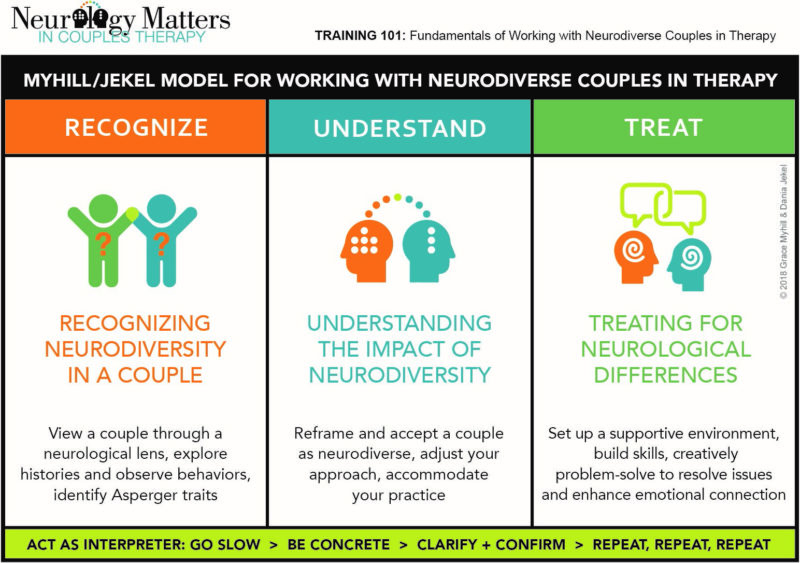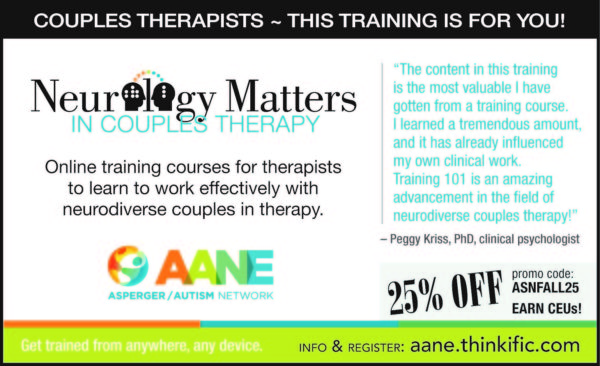In 2018, AANE launched our NEUROLOGY MATTERS IN COUPLES THERAPY, an online training for therapists. Since then, 27 therapists have completed both TRAINING 101: Fundamentals of Working with Neurodiverse Couples in Therapy, and CERTIFICATION 201: Case Presentations and Advanced Topics in Neurodiverse Couples Therapy. In this article, we share how one couple’s relationship turned around once their AANE-trained therapist started seeing and treating them through the lens of neurodiversity.
Prior to taking the AANE training, Nicole did not know that her clients Richard and Tina were a neurodiverse couple – and neither did they.
Nicole: “Richard, a retired electrical engineer, and Tina, a retired second grade teacher, presented with typical couples issues. They felt so unable to understand each other that it was as if they spoke two different languages. They had no emotional or physical intimacy. Trying to navigate the demands of daily life together led to conflict and resentment. None of the therapists they saw previously helped them resolve their issues.
Before getting the AANE training, I worked with Tina and Richard for six months, without seeing the progress I expected. They left our sessions hopeful, but came back the next week without having done the homework or experienced any progress. We all felt frustrated.”
Once Nicole was trained, she started to apply the principles of AANE’s Myhill/Jekel Model to her work with Richard and Tina.
Recognize Neurodiversity in a Couple
Nicole recognized traits of Asperger’s in Richard’s career history:
- Loyalty: Richard had worked for his entire career as an electrical engineer at the same company.
- Superior intelligence, visual thinking: Richard had a gift for solving technical problems. “It was as if I just saw the solution in my head.”
- Executive function and communication challenges: Early on, he was promoted to a management position, but was unable to keep track of many different tasks at once or communicate with the people he was supposed to supervise.
As Nicole further explored Richard’s life history, she recognized more Asperger traits:
- Superior memory helped Richard excel in grade school, high school, and college.
- Weak social skills: When he was young, Richard was shy and didn’t relate to his peers. he spent his free time alone at home with his baseball cards.
- Limited and delayed romantic experience: In college, he spent most of his free time in the library, which is where he met Tina. She eventually asked him out. They dated through college, and married right after graduation.
Nicole also observed Asperger traits in therapy sessions:
- Literal: Richard is mostly quiet, only giving short, literal answers to direct questions.
- Special interest: He usually has a flat affect, but becomes animated when he talks about his passion, baseball.
In the AANE online training for therapists, Nicole also learned about common characteristics of neurotypical spouses in neurodiverse relationships. While some people with Asperger’s marry other people with Asperger’s, many of them marry neurotypical partners in caregiving professions.
Nicole noticed neurotypical spouse traits in Tina:
- Very social helping professional: Tina enjoyed teaching children, maintained friendships with coworkers, and enjoys visiting her children and grandchildren.
- Able to express ideas and feelings fluently: In therapy, Tina talks more than Richard does. She not only answers questions I ask her, but tends to answer for Richard. Initially this seemed controlling, but with my shifted lens I realized she was helping Richard communicate. For example, I learned from Tina that when Richard was promoted to the management position at work, he slept poorly and dreaded going to the office. Even though it was difficult for Richard to address his unhappiness with his boss, she helped him ask for his technical position again.
Understand the Impact of Neurodiversity on the Couple
Nicole recognizes that the couple’s relationship dynamic is typical for a neurodiverse couple, with Tina speaking “neurotypical talk” and Richard speaking “Asperger-ese.”
- They do not share the responsibility of decision making. Richard avoids making decisions, even minor ones like where to have dinner, because he’s afraid he’ll make the wrong choice. Once Tina makes a decision, Richard gets extremely upset if anything changes, because people with Asperger’s like to know what to expect.
- They do not have conversations. Richard likes to spend time alone relaxing and focusing on his special interests. He speaks only when Tina initiates a conversation, and even then may give one word answers or not respond at all. Tina says she feels like she is living with a ghost.
- They do not talk about their feelings. Richard can talk fluently about baseball statistics. When Tina tries to talk about feelings, however, Richard is silent or changes to the subject to something factual. He just doesn’t seem to know how to talk about feelings.
- They can’t seem to get things done around the house – even now, when they have both retired and in theory should have plenty of time. Tina asks Richard to help with household chores, but he doesn’t do them. He gets confused if asked to do more than one thing at a time, or gets anxious if Tina asks him to do something that would interrupt his usual routine.
- Conflict avoidance: Richard forgets to submit reimbursement paperwork to their insurance company. When Tina asks if he did it, Richard says he did – but later Tina finds out he missed the deadline. Many people with Asperger’s fail to understand the future consequences of avoiding conflict in the moment.
Recognizing Tina and Richard as a neurodiverse couple, Nicole adjusted her therapeutic approach and her expectations. She knew progress would take time. She knew that, due to Richard’s executive function and communication challenges, she needed to give him concise information and explicit directions. Nicole explained to Richard how his traits impacted Tina. She explained to Tina that Richard shuts down because he struggles to identify and verbalize his feelings; then, when Tina got upset, his anxiety soars and further impedes his ability to communicate. None of this dynamic is due to lack of caring about each other.
Nicole thoughtfully shared with the couple that they are neurodiverse, and that because of their neurological differences they really do speak two different languages! She started by discussing Richard’s Asperger-based strengths with them: his prodigious memory for facts and figures, superior intelligence, and ability to solve technical problems–traits which led to success in his career and a high standard of living for the family. He also cares deeply about social justice and ethics, is faithful, and wants to make Tina happy.
Next, Nicole pointed out Richard’s challenges with social communication, anxiety, perspective taking, and executive functions.
Nicole asked whether Richard and Tina had ever heard the term Asperger’s or Autism Spectrum Disorder (ASD) used to describe this perplexing combination of strengths and challenges. As one of their grandchildren was recently diagnosed with ASD, they already knew a little about it. Nicole encouraged them to read first-person stories by people on the spectrum and their family members on AANE’s website (www.aane.org).
The idea that they are a neurodiverse couple brought Tina and Richard new understanding of their relationship dynamics, relief, and hope.
Treat for Neurological Differences
Nicole used the tools she learned in the basic course TRAINING 101, and applied them to Tina and Richard’s issues, as she had learned to do in the advanced class CERTIFICATION 201. She taught them structured exercises, had them practice a lot during sessions, and gave a short, concrete homework assignments.
- She helped the partners see themselves as members of the same team, develop strategies to support each other, and share practical decisions and tasks so as to minimize conflict.
- She helped Richard understand the effect his behavior was having on Tina and vice versa.
- She taught them communication techniques she had learned in the training, so they could discuss logistics and plans, thoughts and feelings, hopes and dreams.
- She helped them develop a third language, a common language of connection, using numbered scales, code words and other tools, that both could understand.
As Tina and Richard came to understand and appreciate each other more, they experienced moments of real connection. They felt new hope and satisfaction in their relationship, and their level of intimacy increased.
Now More Help is Available for Neurodiverse Couples
Thirty-five therapists have completed TRAINING 101: Fundamentals of Working with Neurodvierse Couples in Therapy. Therapists who have also completed CERTIFICATION 201: Case Presentations and Advanced Topics in Neurodiverse Couples Therapy have practices in Australia, the UK, Mexico, and many regions of the U.S.A. Neurodiverse couples can search for a therapist on the AANE website: https://www.aane.org/neurodiverse-couples-institute/. Some therapists are able to work with couples remotely.
Neurotypical partners, partners on the spectrum, and neurodiverse couples can also find support through AANE’s online groups. See https://www.aane.org/resources/adults/support-social-groups-couples-partners/.
Online training for therapists for working with neurodiverse couples is available everywhere. For more information about AANE’s NEUROLOGY MATTERS IN COUPLES THERAPY online training see https://aane.thinkific.com/.
For therapists or partners in a neurodiverse couple who would like to learn more about AANE’s online trainings and other resources, contact Grace Myhill at grace.myhill@aane.org.
For more information on Grace Myhill, see https://www.gracemyhill.com/.
A special acknowledgement to Stephanie Loo, M.Ed. AANE Senior Family Support Specialist, for editing.
Grace Myhill is a pioneer and leader in the field of neurodiverse couples therapy. Currently, Grace serves as Director of the Peter M. Friedman Neurodiverse Couples Institute and Director of Couples and Partner’s Services at AANE. Since 2004, she has worked with hundreds of neurodiverse partners together or separately in her private practice and through the AANE neurodiverse couples coaching program. Grace offers a variety of groups, in-person and by video conference, for the many facets of this unique population: for neurodiverse couples together, for partners with an Asperger’s profile, for neurotypical partners who are currently in a neurodiverse relationship, and for neurotypical partners who are co-parenting with an ex-partner with an Asperger’s profile. Grace moderates online discussion forums for the neurotypical partners in a neurodiverse couple and for neurodiverse couples therapists who have taken TRAINING 101. She diagnoses adults with Asperger’s/Autism Spectrum Disorder and offers professional consultations for clinicians about understanding and treating neurodiverse couples.






